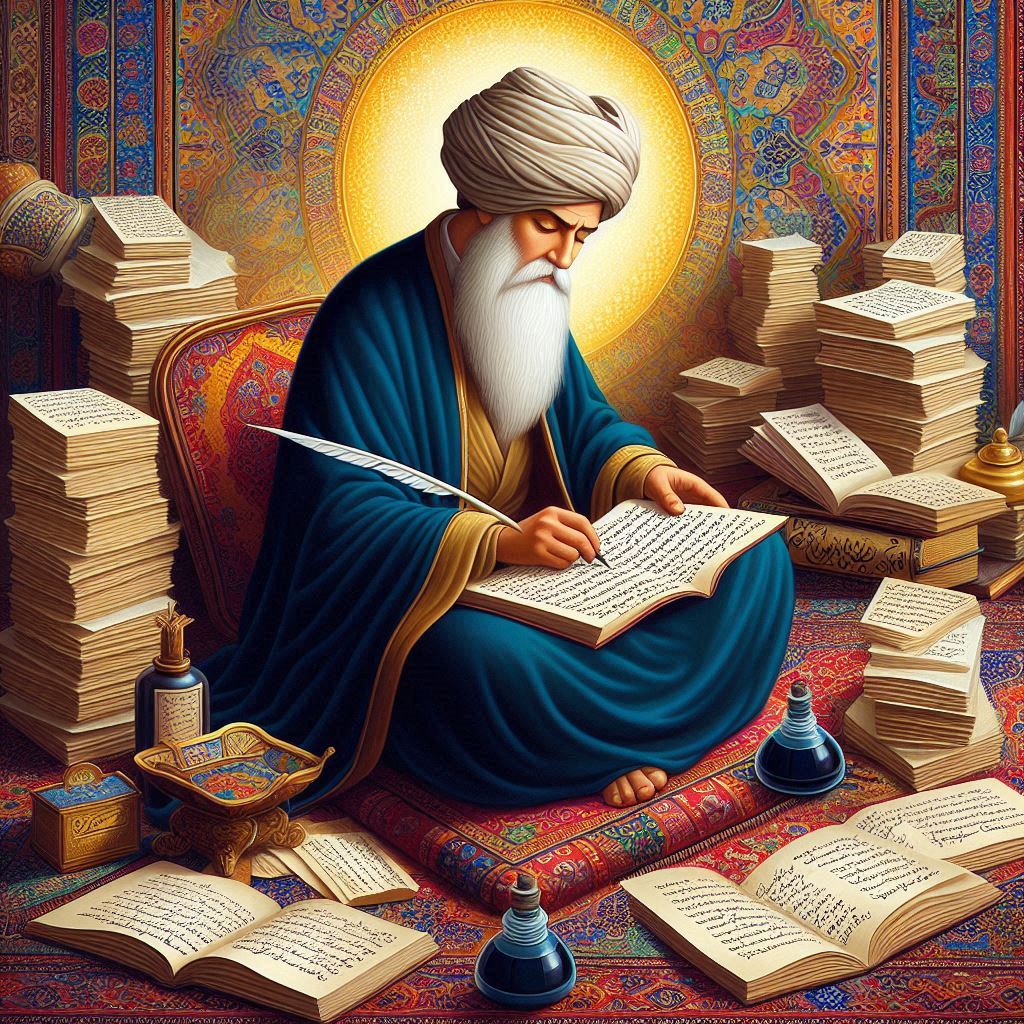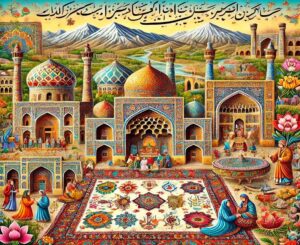Table of Contents
ToggleThe Life and Influence of Rumi
Jalal ad-Din Muhammad Rumi, often known simply as Rumi, is one of Persian literature’s most revered poets and mystics. Born on September 30, 1207, in Balkh, now in present-day Afghanistan, Rumi’s spiritual and literary legacy inspires millions. His works explore themes of love, spirituality, and the human condition, resonating deeply with readers of all ages. Among his many contributions, the “Masnavi” (also spelled “Mathnawi”) stands out as a cornerstone of his oeuvre, often hailed as one of the greatest works of mystical poetry ever composed.
Rumi’s early life was marked by significant upheaval. His family fled the Mongol invasions, eventually settling in Konya, now in modern-day Turkey. It was in Konya that Rumi established himself as a religious scholar and teacher. However, his encounter with the wandering dervish Shams of Tabriz in 1244 profoundly transformed his life. Shams’ influence on Rumi was so profound that Rumi abandoned his scholarly pursuits to delve into the mystical dimensions of existence. This period of intense spiritual awakening and the eventual tragic disappearance of Shams spurred Rumi to express his inner experiences through poetry and music.
Rumi’s legacy extends far beyond his poetry. He founded the Mevlevi Order, commonly known as the Whirling Dervishes, a Sufi order famous for practicing whirling as a form of dhikr (remembrance of God). The Mevlevi Order continues to symbolize Rumi’s teachings, embodying the pursuit of divine love and unity.
Discover the Masnavi: An Epic of Mystical Wisdom
The “Masnavi,” also known as the “Masnavi-ye-Ma’navi” or “Spiritual Couplets,” is Rumi’s magnum opus, consisting of six books of poetry that delve into the depths of Sufi thought and practice. Composed in Persian, the Masnavi comprises approximately 25,000 verses, making it one of the longest mystical poems ever written. It is often called “The Quran in Persian” due to its profound spiritual insights and attempts to capture the essence of divine wisdom.
The structure of the Masnavi is unique and complex. Each book consists of interconnected stories, parables, and anecdotes, which Rumi uses to convey spiritual lessons. These stories are not linear; they weave in and out of one another, creating a rich tapestry of meaning that invites readers to reflect deeply on their spiritual journey.
Themes and Teachings in the Masnavi
The Masnavi covers many themes, all centered around the core Sufi principles of love, unity, and the pursuit of the divine. Some of the central themes include:
- Divine Love: One of the most prominent themes in the Masnavi is divine love. Rumi emphasizes that true love reflects the love between the soul and the Divine. This love transcends the physical realm and seeks union with the eternal.
- Self-Realization and Ego: Rumi often explores the nature of the self and the ego. He teaches that the ego is a barrier to spiritual growth and that one must transcend the ego to attain a higher state of consciousness. Through stories and metaphors, he illustrates the journey from self-centeredness to selflessness.
- Unity and Oneness: A recurring motif in the Masnavi is the idea of unity and oneness with the Divine. Rumi’s poetry often reflects the Sufi belief in the interconnectedness of all existence and the ultimate goal of merging with the divine source.
- Moral and Ethical Lessons: The Masnavi has moral and ethical teachings. Rumi uses parables and anecdotes to convey lessons about humility, generosity, patience, and the importance of living a righteous life.
- Spiritual Transformation: The Masnavi is essentially a guide to spiritual transformation. Rumi’s teachings encourage readers to embark on a journey of self-discovery, shedding the layers of ignorance and illusion to attain spiritual enlightenment.
Literary Style and Impact
Rumi’s literary style in the Masnavi is marked by its lyrical beauty, profound metaphors, and intricate symbolism. His use of storytelling to convey complex spiritual truths makes the Masnavi accessible and engaging to a wide audience. The rhythmic structure of the poetry, coupled with its musicality, enhances the meditative quality of the work, inviting readers to immerse themselves in the spiritual experience.
The impact of the Masnavi extends far beyond the Sufi tradition. It has been translated into numerous languages and continues to be studied and celebrated worldwide. Scholars, poets, and spiritual seekers alike have drawn inspiration from Rumi’s timeless wisdom. The Masnavi’s influence can be seen in literature, philosophy, and popular culture.
Experience the Masnavi
If you are captivated by the profound teachings of Rumi, the Masnavi is a must-read. Immerse yourself in this spiritual masterpiece and explore the depths of divine love, unity, and self-realization. The Masnavi is not just a book but a journey towards spiritual enlightenment and inner transformation.
You can now experience the Masnavi in full glory by shopping for the ebook version. Dive into the mystical world of Rumi and let his timeless wisdom guide you on your spiritual path. Don’t miss the chance to own this masterpiece – shop the Masnavi ebook today and embark on a journey of self-discovery and divine love.
Rumi’s Masnavi remains a beacon of spiritual insight and poetic brilliance. Its timeless teachings resonate with readers, guiding them through self-discovery and spiritual awakening. Through the Masnavi, Rumi invites us to explore the depths of our souls, embrace the transformative power of love, and seek unity with the divine. As we delve into the rich tapestry of Rumi’s poetry, we are reminded of the enduring power of words to illuminate the path to inner truth and transcendence.
Frequently Asked Questions (FAQs)
1. What is the Masnavi by Rumi about?
- Q: What is Rumi’s Masnavi about?
- A: The Masnavi, also known as the Masnavi-ye-Ma’navi or Spiritual Couplets, is a six-book epic poem by Rumi. It delves into themes of divine love, self-realization, unity, and spiritual transformation. Rumi uses interconnected stories, parables, and anecdotes to convey profound spiritual lessons and insights.
2. How did Rumi’s relationship with Shams of Tabriz influence his work?
- Q: How did Shams of Tabriz influence Rumi’s writing, especially the Masnavi?
- A: Rumi’s encounter with the wandering dervish Shams of Tabriz profoundly changed his life, prompting him to explore mysticism deeply. This intense spiritual awakening and Shams’ eventual disappearance inspired Rumi to express his inner experiences through the Masnavi, which reflects his journey toward divine love and enlightenment.
3. What are the main themes in Rumi’s Masnavi?
- Q: What themes are explored in Rumi’s Masnavi?
- A: The Masnavi explores several key themes, including divine love, self-realization, ego, unity with the Divine, moral and ethical lessons, and spiritual transformation. These themes guide readers on a journey of self-discovery and spiritual growth.
4. Why is Rumi’s Masnavi considered a masterpiece?
- Q: Why is the Masnavi by Rumi considered a literary masterpiece?
- A: Rumi’s Masnavi is regarded as a masterpiece due to its lyrical beauty, profound metaphors, and intricate symbolism. Its ability to convey complex spiritual truths through storytelling has inspired readers worldwide and influenced literature, philosophy, and culture.
5. Where can I buy Rumi’s Masnavi ebook?
- Q: Where can I purchase the ebook version of Rumi’s Masnavi?
- A: You can purchase the ebook version of Rumi’s Masnavi online (here) or through Google eBooks, as well as a paperback from Amazon. Owning this spiritual masterpiece allows you to delve into Rumi’s profound teachings on divine love, unity, and self-realization. Shop the Masnavi ebook today and start your journey of self-discovery and enlightenment.







2 thoughts on “Rumi and His Masterpiece: The Masnavi”